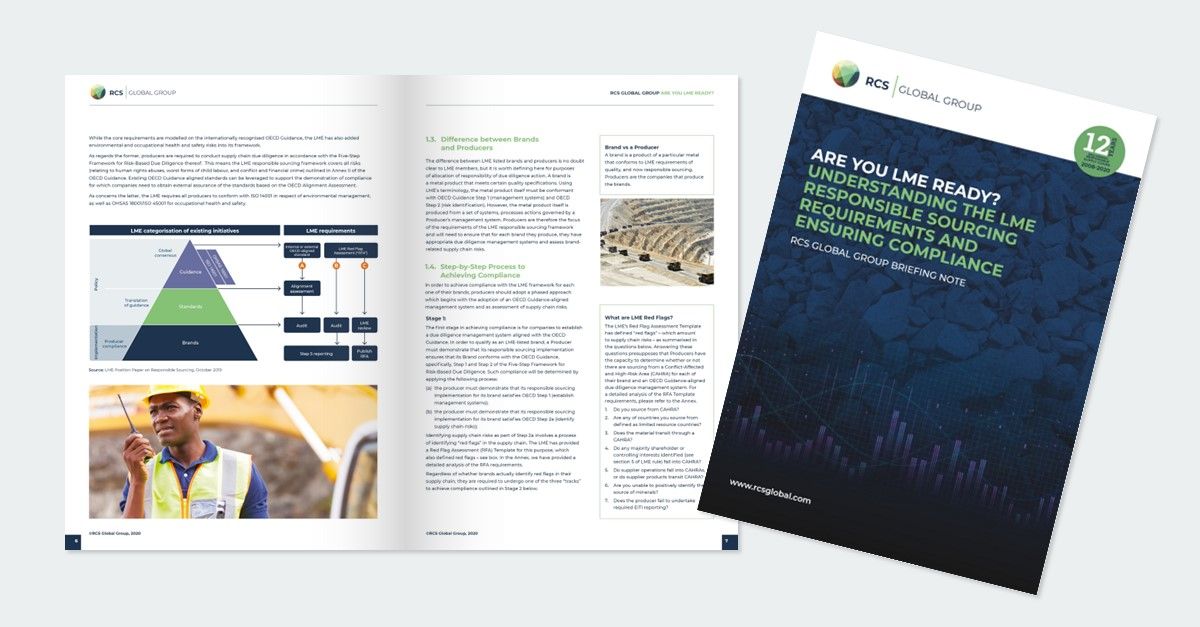
Are you LME ready?
In October the London Metal Exchange announced the launch of new responsible sourcing requirements for all brands listed on the exchange. This is a potentially market changing development that will directly affect LME producers and influence action throughout the wider global metals market.
By 2022 producers are expected to have fully engaged with the new LME requirements with full adoption compulsory by 2023.
This leaves impacted companies with a two-year window to ensure their approach to, and reporting on, responsible sourcing is LME compliant.
For producers and intermediaries outside the LME, this window is also potentially critical as the wider metals market is expected to follow the LME’s direction of travel on responsible sourcing.
Planning for compliance
Over the last few months we have reviewed the new requirements and liaised directly with the LME to establish exactly how the new approach will be applied and how companies can comply.
We have taken that insight and created an easy to use, step-by-step guide to become LME ready.
The guide also takes you through a suite of tailored options RCS Global can provide to your business to make the process quick, comprehensive and cost effective.
To access the full briefing simply email [email protected]
What are the key points to keep in mind at the start of your readiness journey?
You will be expected to meet baseline standards for due diligence and publicly report on action taken
Producers will have to implement both transparency and minimum [OECD Due Diligence Guidance based] standards on supply chain due diligence globally, allowing consumers to understand what kind of responsible sourcing actions they are taking for each brand wherever they are sourcing from.
All mines are in scope
A framework designed to build on existing good practice
The LME’s core standard is the widely recognised OECD Guidance, which is flexible enough to allow companies to apply existing standards that are OECD-aligned when they identify supply chain risks.
Furthermore, producers are required to adopt OHSAS and ISO standards on health and safety, and environmental management.
A pragmatic and clear process
Who do the LME requirements specifically apply to?
The requirements cover all brands (metal products) traded on the LME. As such, a brand’s producer (miner), and any other intermediary in a brand’s supply value chain such as a refiner, must comply with the LME requirements.
Will the LME requirements pose a significant new compliance challenge to miners and their intermediaries?
As with other key responsible sourcing initiatives such as the ICMM’S Performance Expectations or the fledging ICA Copper Mark, the LME’s requirements are founded on the OECD Due Diligence Guidance.
For many LME brands therefore, the building blocks of LME compliance will already be in place. For others, the OECD alignment means that there is already a standardized approach that can be implemented.
However, on the issue of responsible sourcing risks which must be addressed there are additional requirements. Much like the Copper Mark, the LME has gone beyond the OECD Guidance baseline risk areas, expecting companies to also address a range of additional risks covering health and safety and environmental management.
Risks to be addressed on route to LME compliance

What are the key steps to achieving full compliance?
In our briefing paper we go through each step in detail while also outlining how they can be achieved. These steps can be broken down as follows:-
Step One:
Step One: Establish a due diligence management system aligned with the OECD Guidance and undertake a Red Flag Assessment (RFA) of any potential risks in your supply chain. -
Step Two:
Select LME compliance track, based on the results of your RFA. You can adopt one of three tracks to compliance depending on whether or not you identify red flags in your supply chain for each brand. These are mapped out in detail in our briefing paper: -
a. Recognised Alignment-Assessment Standard – you can adopt an internal or an external standard aligned with the OECD Guidance when you identify red flags;
b. Audited LME RFA Track – you can have your RFA third party audited and submit an audit report to the LME, when you do not identify red flags;
c. Published LME RFA Track – you can submit their RFA to the LME for review and subsequent publication, when you do not identify red flags. -
Step Three:
Complete the environmental and OHS compliance process through ISO 14001 and OHSAS 18001/ISO 45001 certification.
What next?
Watch a recording of the joint LME and RCS Global webinar on the LME responsible sourcing requirements (in Chinese) on 4 November 2020